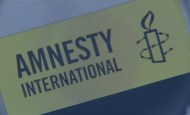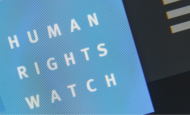Amnesty’s “Apartheid” Report: Recycled Tropes in the Guise of Research
On February 1, Amnesty International posted a 200+ page publication singling-out and targeting Israel as an “apartheid” state, in the NGO-led campaign to delegitimize and isolate Israel, based on the action plan of the 2001 Durban NGO Forum. Although Amnesty officials repeatedly referred to the document as “original research” extending over 4 years (or 3 in other cases), an examination of the contents reveals this to be a collection and repetition of the verbal contortions and discredited claims largely copied from other NGOs with the same agenda.
In particular, the Amnesty text (Israel’s Apartheid Against Palestinians: Cruel System Of Domination And Crime Against Humanity) recycles the accusations, distortions, tropes and specific language from the Human Rights Watch version, A Threshold Crossed: Israeli Authorities and the Crimes of Apartheid and Persecution published in April 2021, and analyzed by NGO Monitor. The overwhelming similarity between the two documents highlights the symbiotic and self-affirming relationship between the members of the anti-Israel NGO network, and their methodology of recycling discredited tropes and misinformation.
Both publications consist primarily of the following themes:
- Antisemitic tropes such as Jewish “supremacy” or “domination”
- An artificially constructed and incoherent definition of the term “apartheid”
- Exploiting the apartheid framework while falsely claiming not to be comparing Israel to the South African system
- Singling-out Israel uniquely and without comparison to other countries (an example of antisemitism according to the consensus IHRA working definition)
- Deleting the history and the context of the conflict, including Palestinian terror and war crimes
- Recommendations of sanctions and other punitive measures to isolate and delegitimize Israel, in accordance with the 2001 Durban NGO plan of action
- Rejection of Israel’s identity as a Jewish state and the denial of the Jewish people of the right to sovereign equality and self-determination (an example of antisemitism according to the consensus IHRA working definition)
Examples of Similar or Identical Language:
| HRW | Amnesty |
|---|---|
| 200 appearances of the word “apartheid” | 404 appearances of the word “apartheid” |
| 64 appearances of the words “domination” and “dominate” | 170 appearances of the words “domination” or “dominate” |
| “The report does not set out to compare Israel with South Africa under apartheid or to determine whether Israel is an “apartheid state”—a concept that is not defined in international law. Rather, the report assesses whether specific acts and policies carried out by Israeli authorities today amount in particular areas to the crimes of apartheid and persecution as defined under international law.” | “This report does not seek to argue that, or assess whether, any system of oppression and domination as perpetrated in Israel and the OPT is, for instance, the same or analogous to the system of segregation, oppression and domination as perpetrated in South Africa between 1948 and 1994.” |
| “Demographic considerations, in particular the quest for a strong Jewish majority, have long underlined Israeli government policy.” | “Demographic considerations have from the outset guided Israeli legislation and policymaking." |
| “Israeli authorities have pursued an explicit policy of ensuring Jewish control over geographic areas with strategic importance where there are concentrations of Palestinians across Israel and the OPT. Judaization of these areas contributed to facilitating Israeli government control over Palestinian population centers, dividing communities, and blocking the establishment of larger, contiguous Palestinian municipal areas in locations that Israeli authorities covet or consider particularly strategic.” | Israel has used similar land expropriation measures across all territorial domains under the Judaization policy, which seeks to maximize Jewish control over land while effectively restricting Palestinians to living in separate, densely populated enclaves to minimize their presence. This policy has been continuously pursued in Israel since 1948 in areas of strategic importance that include significant Palestinian populations such as the Galilee and the Negev/Naqab, and has been extended to the OPT following Israel’s military occupation in 1967. |
| “While the Supreme Court often opts against disqualifying candidates for violating these provisions, the provisions formally block Palestinians from challenging the laws that codify their subjugation and, in so doing, diminish the value of the right of Palestinian citizens to vote. The fact that no government in Israel’s history has ever included representatives of a Palestinian-led party highlights the political disempowerment of the community.” | “Over the years, the Supreme Court has in general overturned attempts by the Central Elections Committee to ban Palestinian parties and disqualify Palestinian candidates for violating these provisions on the basis of public statements expressing views deemed unacceptable to the majority of Knesset members. However, these provisions prevent Palestinian lawmakers from challenging laws that codify Jewish Israeli domination over the Palestinian minority, and unduly limit their freedom of expression, and as a result, impede their ability to represent the concerns of their constituents effectively.” |
| The Basic Law: Israel—The Nation-State of the Jewish People (‘Nation-State Law’) passed in 2018, in effect affirms the supremacy of the “Jewish” over the “democratic” character of the state. | Israeli law thus establishes a superior “Jewish nationality” status that is distinct from citizenship and the basis for differential treatment of Jewish and non-Jewish citizens. |
| This path grows out of the 1950 “Law of Return,” which guarantees Jewish citizens of other countries the right to settle in Israel. The Citizenship Law states that Jews already living in Israel at the time gain citizenship via this path, as opposed to the “residence in Israel” one. Palestinians, by contrast, obtained citizenship in 1952 via the second path, “residence in Israel.” | The Law of Return is effectively a nationality law that grants every Jew, regardless of where they reside in the world, the distinct right to settle in Israel with full legal and political rights. …By contrast, Palestinian citizens of Israel are granted citizenship rights based on residence in Israel. |
| The 1950 Law of Return, which guarantees Jews the right to immigrate to Israel and gain citizenship, defines “Jew” to include “a person who was born of a Jewish mother,” embracing a descent-based, as opposed to a purely religious, classification. | An example of the overlap between race, religion and descent is evident in Israel’s Law of Return, which defines “Jew” to include “a person who was born of a Jewish mother.” |


